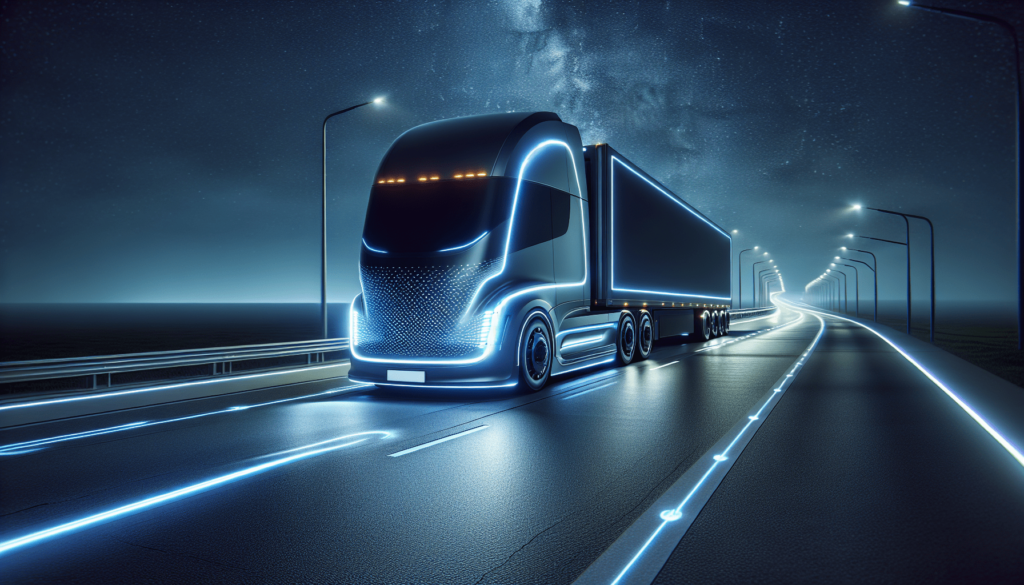Imagine a world where the rumbling sound of diesel engines is replaced by the smooth hum of electric motors as trucks traverse the highways. In this future, Tesla trucks take the center stage, revolutionizing the trucking industry with their cutting-edge technology and sustainable approach. With the impending arrival of Tesla trucks in 2020, the future of trucking is poised to be smarter, greener, and more efficient than ever before. Get ready to witness a new era in transportation as Tesla ignites the road with their groundbreaking electric trucks.

Introduction
Welcome to the future of trucking! In this article, we will explore the impact of Tesla trucks on the trucking industry. Tesla, known for its innovative electric vehicles, has set its sights on transforming the world of commercial transportation with its line of electric trucks. As we dive into this topic, we will discuss the advantages and disadvantages of electric trucks in the industry, as well as the increased focus on sustainability and environmental impact.
The impact of Tesla trucks on the trucking industry
Advantages of electric trucks in the industry
Electric trucks bring numerous advantages to the trucking industry. One of the first and most prominent advantages is the reduction in operating costs. Electric trucks have significantly lower fuel and maintenance costs compared to their diesel counterparts. With electric trucks, you can say goodbye to expensive diesel fill-ups and frequent repairs.
Another advantage of electric trucks is their environmental impact. By eliminating fossil fuel consumption, electric trucks help reduce carbon emissions and promote cleaner air. With growing concerns about climate change, many companies are prioritizing sustainability and looking for ways to minimize their environmental footprint. Electric trucks offer a compelling solution in achieving this goal.
Disadvantages of electric trucks in the industry
While electric trucks have many advantages, there are also some disadvantages that need to be considered. One of the main concerns is the limited range and charging infrastructure. Electric trucks currently have a lower range compared to diesel trucks, which may require more frequent charging or shorter routes. However, with advancements in battery technology and the expansion of charging infrastructure, these limitations are expected to improve.
Another disadvantage is the initial cost of electric trucks. Electric vehicles, in general, have a higher upfront cost compared to traditional vehicles. However, it’s important to note that over time, the savings on fuel and maintenance costs can offset the initial investment. As technology continues to advance, it is likely that the cost of electric trucks will also become more affordable.
Increased focus on sustainability and environmental impact
The trucking industry has traditionally been associated with high carbon emissions and environmental impact. However, with the introduction of Tesla trucks and other electric vehicles, there has been a shift towards sustainability and reducing carbon footprints. Companies that adopt electric trucks can position themselves as environmentally conscious and contribute to a greener future. This increased focus on sustainability not only benefits the environment but also helps improve public perception and brand reputation.
Technical specifications of Tesla trucks
Range and charging capabilities
Tesla trucks boast impressive ranges for electric vehicles. The Tesla Semi, for instance, is said to have a range of up to 500 miles on a single charge. While this may be lower compared to diesel trucks, advancements in battery technology are expected to further extend the range in the coming years. Additionally, Tesla has been working on a network of “Megachargers” that allow for fast charging, enabling long-haul journeys without significant downtime.
Power and performance
Tesla trucks are known for their impressive power and performance. They can accelerate from 0 to 60 mph in just a few seconds, even when fully loaded. With electric motors delivering instant torque, Tesla trucks offer exceptional acceleration and handling capabilities. This not only improves efficiency but also enhances the overall driving experience for truckers.
Autonomous capabilities
Another groundbreaking aspect of Tesla trucks is their potential for autonomous driving. Tesla has been at the forefront of autonomous vehicle technology and aims to incorporate similar features into their trucks. While full autonomy is still being developed and faces regulatory challenges, Tesla trucks will likely offer advanced driver-assistance systems (ADAS) that can enhance safety and efficiency on the road.
Safety features
Tesla is renowned for its commitment to safety, and this extends to their trucks as well. Tesla trucks are equipped with advanced safety features, including collision detection, automatic emergency braking, and lane departure warnings. These features help mitigate the risk of accidents and enhance overall road safety for truck drivers.
Implications for truck drivers
Automation and potential job displacement
With the advent of autonomous technology, there is growing concern about job displacement in the trucking industry. It is important to note that the transition to autonomous trucks will likely be gradual, with human drivers still playing a crucial role in the foreseeable future. While some repetitive tasks may be automated, there will still be a need for skilled truck drivers to oversee operations, handle complex situations, and ensure overall safety.
Training and adaptation to new technology
To adapt to the evolving trucking landscape, truck drivers may need to undergo additional training to familiarize themselves with the new technology. This could include learning how to operate and maintain electric trucks, as well as understanding the features of autonomous driving systems. Embracing technology and acquiring the necessary skills will be key for truck drivers to remain competitive and thrive in the industry.

Infrastructure challenges and opportunities
Expansion of electric charging infrastructure
As electric trucks become more prevalent, there is a need for an extensive charging infrastructure to support their operations. This requires collaboration between government entities, private companies, and utility providers to develop a widespread network of charging stations. Expanding the charging infrastructure will not only benefit truckers but also encourage the adoption of electric vehicles in other sectors, such as personal transportation.
Integration with existing logistics networks
Integrating electric trucks into existing logistics networks presents both challenges and opportunities. Companies will need to reevaluate their supply chains and make adjustments to accommodate the charging needs and range limitations of electric trucks. Additionally, optimizing routes and scheduling charging stops will be essential to ensure efficient operations. However, this integration also opens up opportunities for logistics companies to showcase their adaptability and environmental commitment by embracing electric trucking.
Government policies and regulations
Incentives and support for electric truck adoption
To expedite the adoption of electric trucks, governments can play a pivotal role by offering incentives and support. These could include financial incentives such as tax credits or grants, as well as regulatory measures to encourage fleet electrification. Governments can also collaborate with utility providers to facilitate the expansion of charging infrastructure. By creating a favorable environment for electric truck adoption, governments can accelerate the transition to a cleaner and more sustainable transportation system.
Concerns regarding safety and regulation of autonomous vehicles
Autonomous technology raises several concerns regarding safety and regulation. As autonomous features become more prevalent in Tesla trucks, there will be a need for standardized regulations to ensure the safe operation of these vehicles on public roads. Stakeholders, including government agencies, manufacturers, and safety organizations, must collaborate to establish guidelines and assess the readiness of autonomous technology before widespread implementation.
Market adoption and competition
Current market share and growth projections for Tesla trucks
Tesla faces competition from both traditional manufacturers and startups in the electric truck market. While they have made significant strides, market adoption of Tesla trucks is still in its early stages. However, with their established brand and technological advancements, Tesla is well-positioned to capture a significant market share in the coming years. Industry experts predict strong growth for Tesla trucks as their value proposition becomes more compelling to fleets and logistics companies.
Competition from traditional manufacturers and startups
As electric trucking gains momentum, traditional manufacturers and startups are also entering the market. Established manufacturers such as Daimler and Volvo are developing their own electric trucks, aiming to leverage their existing infrastructures and distribution channels. Startups, on the other hand, are disrupting the industry with innovative designs and approaches. The competition within the electric truck market will drive further advancements and affordability, benefiting both truckers and the broader industry.
Impact on the shipping and delivery industry
Efficiency improvements and cost reductions
The adoption of Tesla trucks and electric vehicles in the shipping and delivery industry can lead to significant efficiency improvements and cost reductions. Electric trucks offer lower maintenance and fuel costs, reducing expenses for fleet operators. Additionally, advancements in autonomous driving technologies can optimize operational efficiency by minimizing downtime and optimizing routing. These improvements translate into faster and more cost-effective deliveries, benefitting businesses and consumers alike.
Disruption of traditional logistics models
The introduction of electric trucks disrupts traditional logistics models. With longer charging times and limited ranges, companies will need to rethink their delivery strategies and adapt to these new realities. This may involve reevaluating warehouse locations, optimizing routes based on charging station availability, and adjusting delivery schedules. While this disruption may initially pose challenges, it also presents an opportunity for businesses to innovate and develop new models that leverage the advantages of electric trucking.
Potential for new business models and services
The rise of electric trucks opens doors to new business models and services within the shipping and delivery industry. Companies can explore opportunities in charging infrastructure development, battery swapping services, or even offering charging stations as part of logistics networks. Additionally, the integration of autonomous features may lead to the emergence of trucking as a service (TaaS) models, where fleets of autonomous trucks can be utilized on-demand by multiple businesses. These new business models have the potential to revolutionize the industry and unlock additional value for all stakeholders.
Environmental benefits and sustainability
Reduction of carbon emissions
One of the most significant environmental benefits of electric trucks is the reduction in carbon emissions. The transportation sector is a major contributor to greenhouse gas emissions, and by transitioning to electric trucks, we can significantly reduce the carbon footprint of the industry. Electric trucks produce zero tailpipe emissions, helping to combat air pollution and mitigate the impacts of climate change.
Promotion of renewable energy sources
The adoption of electric trucks goes hand in hand with the promotion of renewable energy sources. As the trucking industry shifts towards electric vehicles, the demand for electricity will increase. This provides an opportunity to expand renewable energy generation and reduce reliance on fossil fuels. By integrating electric trucks into a renewable energy ecosystem, we can achieve a more sustainable and cleaner transportation system.
Conclusion
As we look forward to the future of trucking, Tesla trucks stand at the forefront of revolutionizing the industry. With their numerous advantages, including lower operating costs, improved sustainability, and advanced technology, electric trucks pave the way for a greener and more efficient transportation system. While the challenges of infrastructure, regulations, and market competition remain, the potential for positive impact is tremendous. By embracing the opportunities brought by Tesla trucks, the trucking industry can reshape itself to meet the demands of the modern world while prioritizing sustainability and efficiency. So, get ready to embark on an electrifying journey towards a cleaner, greener, and smarter future of trucking with Tesla trucks in 2020 and beyond.
